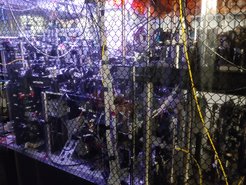Dr. Lucas Hackl
Main Focus
Since August 2018 Dr. Lucas Hackl is working as MPHQ fellow in the group of Prof. Ignacio Cirac. His Co-PI in Harvard is Prof. Eugene Demler.
Research goal
In order to study complex quantum systems, one needs to overcome the exponentially large or even infinite dimensionality of the state manifold. The goal of my research is to find suitable classes of states that can capture relevant physical properties but have a sufficiently small dimension to make computations and even some analytical studies feasible. In particular, we are interested in generalizing and extending existing methods for Gaussian states to new classes of non-Gaussian states.
Possible applications
The applications of such generalized Gaussian states range from fundamental theory (in particular, quantum fields) to condensed matter physics and the study of cold atoms in quantum optics. An efficiently parametrized new class of states can lead to novel analytical results about concrete physical systems whose ground or eigenstates can be approximated, but also to develop numerical tools exploiting these methods to compute physical quantities.
Collaboration with Harvard
Apart from the development of new variational classes of states, we are collaborating with researchers at Harvard to develop systematic methods for the study of ground states, low lying excitations and linear response of many body quantum systems. A recent application includes the paradigmatic Bose-Hubbard model, for which we extended the well-known Bogoliubov theory to a tangent plane approximation capturing both one- and two-particle excitations to compute spectra and quasi particle decay.
Information about Dr. Hackl's research visits to Harvard
Duration of stay: Total of 3 stays ranging from 1-3 weeks
Visited PI: Eugene Demler
Please shortly describe the major scientific aspects of your research stay at Harvard?
The main focus of my research as MPHQ Fellow was to understand and develop methods for the efficient simulation of complex quantum systems. Here, the key challenge is that the dimension of the Hilbert space scales exponentially with the number of degrees of freedom in the system. Instead of describing the full Hilbert space, one chooses a suitable family of states (called: variational family), which captures the relevant physics well, but is not exact.
Together with Ignacio Cirac and Eugene Demler at Harvard, I started to explore the geometric structure of these variational methods and also new variational families, namely generallized Gaussian states. To benchmark our methods, we applied them to the paradigmatic Bose Hubbard model which describes cold atoms in an optical lattice. Here, we could (a) approximate the ground state, (b) compute low lying excitation energies and (c) the linear response of the system to external perturbations.
What was the most vital scientific added value you derived from the exchange?
The three visits at Harvard were stimulating and important: During my first visit, also Ignacio Cirac and Tommaso Guaita (PhD student in the project) and I had several discussions with Eugene Demler that led us to studying the properties of the so called Higg’s mode in the Bose Hubbard model. During my second visit, we already had most of the results and it was crucial to discuss their interpretation in person with Eugene Demler. Finally, my third visit gave me the opportunity to present my research at the MPHQ Spring Scientific Meeting 2019. This led to discussions with other members of the research center, including Immanuel Bloch, Mikhail Lukin and Susanne Yelin.
How will the exchange enrich your scientific work at MPQ?
The exchanges already enriched my scientific work in various ways. Meeting Eugene Demler helped me to connect the rather abstract perspective of differential geometry with the resulting implications for actual experiments. Eugene Demler is a master in drawing these connections, which is extremely relevant when developing new techniques to simulate real quantum systems. Another important aspect of the exchange was to meet graduate students and postdocs at MPHQ. In particular, my discussion with Yao Wang, an MPHQ Fellow in Eugene Demler’s group, were inspiring and will likely lead to future collaborations.
Will your stay lead to any prospective collaborations or joint publications with the visited group(s) at Harvard?
Yes, the collaboration already lead to a first paper, which is currently under review, but is already available on the arXiv as arXiv:1907.04837. Furthermore, we are continuing to collaborate to understand the geometry of variational methods and the properties of generalized Gaussian states.
What did you like the most about the exchange from a personal perspective?

Both, MPQ and Harvard provide extremely stimulating research environments. Having had the opportunity to make connections and meet people at both places will be valuable for future projects. There are two experiences that stood out for me: First, I had the chance to join a lab tour to see the wide range of quantum optics experiments conducted at Harvard. In particular, I was thrilled to see the experiment of Markus Greiner (see photo below) where his group was able to measure entanglement entropies by looking at the statistics of measurement outcomes. As I had worked on the theoretical concept during a large of my PhD, it was exciting for me to see how the abstract concept is now successfully studied in reality. Second, I also enjoyed my time in the wonderful city of Camridge with several visits to Boston: My visits were set in Febaru/March, April and May, which allowed me to see the transformation from winter (with a lot of snow!) into a beautiful spring.
